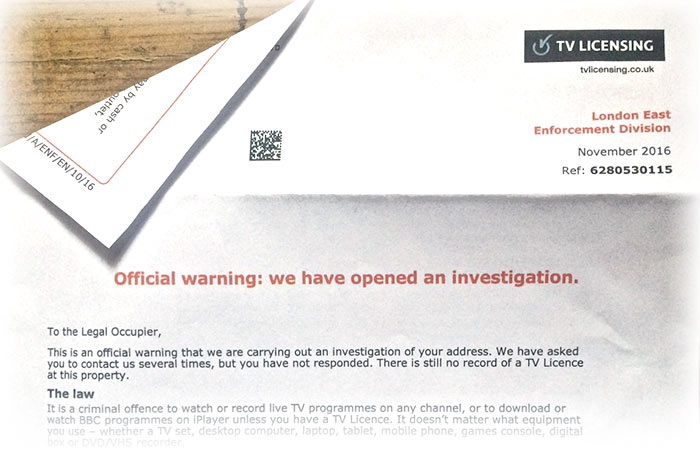In February the UK government started a consultation on decriminalising TV licence evasion. The DCMS openly pondered whether, five years since the Perry Review (PDF) the broadcasting landscape has changed, and if criminal sanctions remain appropriate for TV licence fee evasion. Consultation closes today at 5pm but the BBC's official response to the concept has already been published for perusal. Other businesses, organisations, and individuals will have responded too. At the time of writing a colour TV licence costs £157.50 pa.
In its response (PDF), the BBC says it strongly supports the status quo, at least for the medium term. It warns that to decriminalise non-payment of the licence fee would have a £300m impact on its coffers. This is because it estimates that license fee evasion would double to about 10 per cent of households and that would result in a loss of £200m directly and another in £100m civil court costs.
In the last year we have figures for, 130,000 people were prosecuted for non-payment of the licence fee with five people in England and Wales sent to prison for failing to pay the resulting fines. This rather large scale human misery is justified as "The BBC is a universal service – one to which everyone contributes and everyone receives something in return," said the corporation. "Any system based on a universal contribution must have a sufficient deterrent and sanction to ensure that principle holds up and the system is fair to those who do pay, as well as those who don't."

BBC: perhaps we can put a levy on your utility bills?
While it is interesting to see the arguments for and against decriminalising TV licence fee evasion, perhaps more interesting is one of the alternative funding models being put forward by the BBC. "In some countries the TV licence, or equivalent, is linked directly to an existing common household bill," relates the BBC statement. "For example it is collected through electricity bills in Italy and the equivalent of council tax bills in France. Another option to consider as the UK progresses towards universal access could be broadband bills."
Importantly the BBC is "not, at this stage, advocating," adding levies to UK household utility bills like broadband bills but it does flag the alternative funding scheme as being potentially "simpler, more efficient and more automated".
The thought of the BBC tapping into utilities will cause some to feel uneasy as utilities are essential while the BBC's output isn't. Furthermore, the extra charges could be significant as a proportion of the bill - for example my fibre broadband costs £21pcm but the current monthly fee for a BBC TV license is £13.13.













